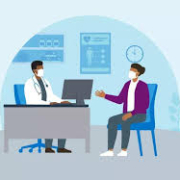6 Easy Tips to Talk to Your Physician Regarding Embarrassing Symptoms!
Let’s be honest—some stuff just feels awkward to say out loud. Especially when it’s about your body.
Maybe it’s a weird smell. Or something is going on down there. Or a bathroom issue that’s been bugging you for weeks.
It can be tough to talk to your doctor about it. But here’s the thing—you’re not the only one dealing with it. And your physician? They’ve probably seen and heard way worse.
Still, if you’re someone who avoids appointments just to dodge the conversation, this post is for you.
I’ve put together 6 easy tips to talk to your physician regarding embarrassing symptoms, based on real experience and chats with the best physician in Nagpur.
These tips aren’t magical, but they’ll help you stop overthinking and start getting the help you need.
6 Easy Tips to Talk to Your Physician Regarding Embarrassing Symptoms
1. Write It Down First
If your brain goes blank the second the doctor says, “What brings you in today?”—you’re not alone.
- Jot down what’s been happening.
- Include how long it’s been going on.
- Add anything that makes it better or worse.
You don’t have to write a novel. Even a few bullet points in your phone’s notes app are enough. If you’re shy about saying it out loud, just hand over your phone or a paper note.
That’s fine. Doctors appreciate honesty more than perfect delivery.
And don’t worry about spelling. You’re not taking an exam. Just be real.
2. Use Simple, Honest Words
You don’t need fancy medical terms. Just say what’s bothering you in your way.
Instead of saying something like “I believe I’m experiencing gastrointestinal distress,” just say, “I’ve been having really bad gas and stomach cramps.”
That’s clear. That’s helpful. And most importantly—it’s true.
Here’s a quick trick: Pretend you’re texting a friend. What would you type? Start there.
Your physician will take it from there.
3. Remind Yourself: This is Their Job
Let’s talk mindset.
Doctors chose this profession. Most have seen and heard everything you could imagine—and probably a lot you couldn’t.
- Weird smells? Yep.
- Rashes in sensitive areas? Seen it.
- Anxiety about sexual stuff? Every day.
So if you’re stuck thinking, “This is so embarrassing,” flip it.
Think, “They’ve probably helped someone with this already.”
And if the weather lately has been dragging your mood down (Nagpur’s monsoon gloom, anyone?), your mental health might also be affecting your physical symptoms. Bring that up, too.
Your body and brain aren’t separate.
4. Schedule the Right Time
Timing matters more than you think.
Avoid rushed walk-ins or the tail end of the day when things feel hectic. Instead, try to:
- Book the first slot of the day if possible.
- Ask for a longer consultation if you’ve got more than one issue.
- Let the receptionist know it’s a personal issue—you don’t have to go into detail.
The best physicians in Nagpur, like Dr. Deshmukh, often offer teleconsultation slots too. That might feel easier for opening up, especially from the comfort of your home.
And yes, indoor comfort can help. Especially when gloomy weather makes it harder to get out.
5. Stretch Before Your Appointment
This might sound weird, but hear me out.
Stretching helps ease tension, especially when you’re feeling anxious or awkward.
Before heading to your appointment (or logging into a virtual one), try a few simple stretches:
- Shoulder rolls
- Neck stretches
- Gentle spinal twists
It’s like telling your nervous system, “Hey, it’s okay. You’re safe.”
Bonus: If you’ve been stuck indoors lately (thanks, monsoon), your body probably needs movement anyway.
You don’t need a full workout. Just 5-10 minutes of movement can help clear your mind and loosen up that nervous energy.
6. Start With Just One Sentence
Still not sure how to begin? Just say one sentence.
Something like:
- “This is kind of awkward, but I need your help with something.”
- “I’m not sure how to say this, but I’ve been dealing with something private.”
- “Can I ask you something a bit personal?”
That’s it. Most doctors will instantly understand you’re about to bring up something sensitive. They’ll guide the rest of the conversation.
You don’t have to explain everything perfectly. You just have to start.
Once the words are out, it gets easier.
How Mental Health Ties Into This
Let’s not ignore the mental side of things.
Feeling embarrassed isn’t just about being shy. Sometimes, it’s rooted in anxiety, trauma, or even depression.
Nagpur’s rainy season brings gloomy skies and low energy. And indoor workouts help—but only if you’re moving consistently.
When your mood is low, you’re less likely to:
- Seek medical help
- Open up honestly
- Follow through on appointments
That’s why taking care of your mental health matters just as much as treating physical symptoms.
Talk to your doctor about this, too. Say:
- “I’ve been feeling low lately.”
- “I’m tired all the time and not sure why.”
- “I haven’t felt like myself in weeks.”
That’s enough to start a deeper conversation. And it can lead to real help.
A Few Extra Tips (From Someone Who’s Been There)
- Don’t wait until it gets worse. Most embarrassing symptoms don’t go away magically. They often get worse the longer you wait.
- Skip Google (for now). Searching for your symptoms at 2 AM might only make you panic. Let your physician interpret the signs.
- Stay consistent. If you start treatment or therapy, give it a real chance. Your doctor isn’t expecting miracles overnight.
Everyone has something they’re scared to bring up. You’re not alone.
Whether it’s itching, leaking, bleeding, or something you can’t even name yet—it’s valid.
You deserve answers. And relief.
Use these tips to talk to your physician regarding embarrassing symptoms. Book that appointment. Take a deep breath. Say the thing out loud.
Your doctor is there to help, not to judge.
And hey, while you’re at it, throw in some light indoor stretches, move your body a bit, and take a break from the news. Bad weather can mess with your head.
Start small. Just talk.


